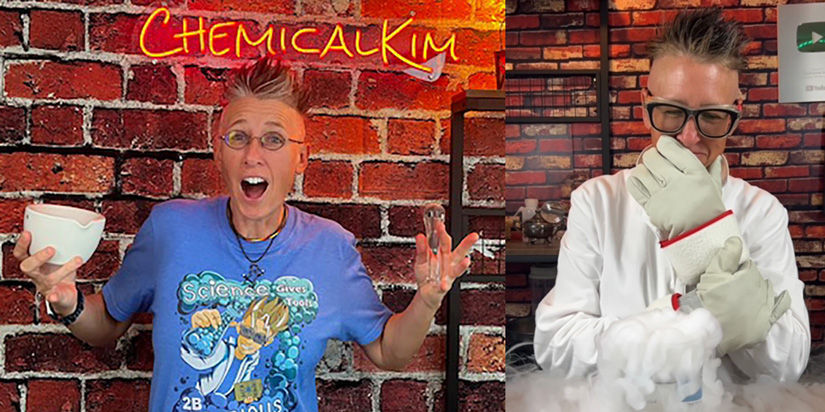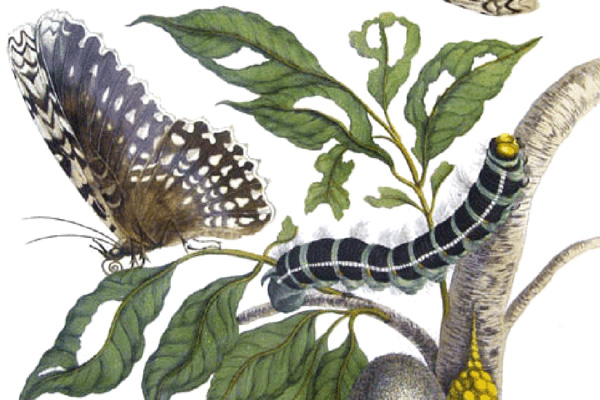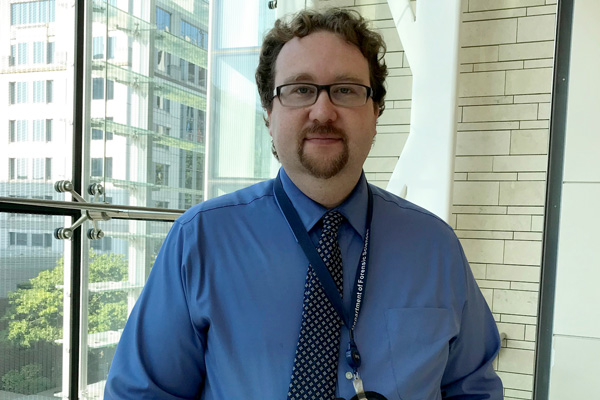Chemical Kim
B.S.: Chemistry, Michigan Technological University
M.S.: Chemistry, Central Michigan University
WHAT SHE DOES NOW: Chemistry Professor and Science Education Influencer
by Felicia Chaplin
Downloads:
When COVID-19 made it hard for people to attend live science demonstrations, Chemical Kim found a way to bring science to them, through YouTube, Instagram and TikTok. Chemical Kim uses her multi-media platforms to talk about chemistry in a way that is inclusive and uncomplicated.
Her demonstrations are eye-catching, and the explanations that follow instructive. Her one-minute videos explain everything from the Leidenfrost effect to non-Newtonian fluids Since going live on social media, Chemical Kim now has over a million followers.
—Felicia Chaplin
The Leidenfrost effect occurs when a cold liquid comes in contact with a surface that is much warmer. The liquid turns to a gas quickly and forms an insulating layer of gas above the warm surface.
Non-Newtonian fluids flow differently depending upon the pressure that is applied to them. For example, when you squeeze or poke at slime, it feels hard and solid, but release it, and it will ooze through your fingers. Water, a Newtonian fluid, doesn’t do that. It will always flow through your fingers, as its flow is not dependent on pressure.
This interview was edited for length and clarity.
What made you want to have a career in chemistry?
I think it started with my relationship with my Mom. I was an extremely curious kid. I would constantly ask why? And how do you know? My Mom didn’t just give me answers, but instead she would encourage me to try and find the answer myself. Scientists are always looking at ways to figure things out and finding new tools and then restructuring our thought process with what we do discover.
What made you seek out social media as a platform?
My students and I did a science class for the kids at a children's hospital; we called it Science Friday. When the pandemic hit, the hospital said we couldn’t come so I started to do virtual events. I posted some videos to YouTube and Instagram. Then the TikTok community reached out and asked me to join their educational platform. At first, I would just make videos with cool music, but my platform exploded when I started to teach science. People really do want to understand the ingredients in Pepto Bismol.
What is your philosophy about teaching and learning chemistry?
Everyone should and can learn science; your life is better when you know science, and that science isn’t reserved for a specific population. I try not to use language that people don’t understand, because I want everyone to feel equal, accepted and included in learning science.
What advice would you have for future influencers?
I think my biggest encouragement is to stay true to who you are, obviously, and don't do it with the intent that you're planning on making a career out of it. The other huge thing is to ignore the trolls. If you were a rock star performing live and one person in the middle of the crowd was yelling obscenities at you and saying you are the worst of the worst, do you think you would be hearing that all the way up on the stage? So don’t reply to the hate because when you do you’ve just brought them up on stage with you. Don’t give them your platform.
Do you have a favorite video that you’ve done?
The one where I splash liquid nitrogen on my hand, and it doesn’t hurt or burn because of the Leidenfrost effect. I think people really like it because it is a “wow” thing to watch. But what I loved about it is that it brought so many people into the conversation on my platform—from those who have a very strong science background to those who have no science background whatsoever.
What other advice do you have for high school chemistry students?
Don't be afraid to take that journey and face your fears. It's hard work, and there will be moments when you want to give up. But you can't because there's going to be a time when you're going to be doing something that you enjoy.
What has surprised you the most about being a science influencer?
My biggest surprise was that I was embraced, and I was accepted for being myself.






